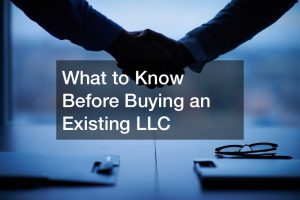
The prospect of buying an existing LLC is enticing due mainly to how simple the endeavor appears. LLCs are quite manageable, especially if you’re willing to bring in outside help. The taxation aspect of owning an LLC also doesn’t come with the usual burdens associated with co-owning a company. Even so, purchasing an LLC requires careful consideration and due diligence on the part of the investors. Learn more about the process and what you can expect by continuing below.

How Much Will It Cost?
Before we dive any further into the topic of buying an existing LLC, let’s first discuss an obvious question. Can you afford to purchase an existing LLC? That question has no uniform answer because LLC price tags can vary significantly. However, there are some key factors that affect those price points.
The first major consideration is your intended approach to the purchase. Buyers can purchase the entire LLC or take ownership of its assets. Taking on the entire LLC can speed up the purchase and lower the price tag, but it also means accepting the company’s financial obligations. The lower price tag may not be enough of an incentive to complete that purchase.
Only purchasing the LLC’s assets has its drawbacks, too. The main drawback is having to form a new LLC. You’ll have to pay for documentation costs and other related expenses.
The final cost of the LLC will also depend on your negotiating ability. How far can you move the owners of the LLC off their original number by highlighting the merits of your offer? Remember only to make offers after you’ve reviewed the LLC’s books. An LLC refusing to open its books to a serious buyer is a red flag, and that should be your reason to look elsewhere.
When accounting for the costs of buying an existing LLC, don’t forget the expenses associated with hiring the right people. At a minimum, you’ll need a business broker. The broker can analyze the LLC and negotiate the purchase. Get them on your team before you proceed any further with the purchase.
What’s Their Reach?
One of the main advantages of buying an existing LLC is gaining access to its customer base. The LLC is an established entity, so one might assume it has loyal patrons. It’s easy to see the reasoning behind that thought. Still, you cannot afford to base your purchase on that assumption.
Hire a broker and ask them to look closer at the LLC’s customer base and reach. Are they in line with what you should get from a company that has been around for a similar timeframe? Is the company still generating new business, or is it entirely dependent on the support of its old patrons?
Those are just some of the reach-related questions you’ll have to answer before deciding if an existing LLC is worth purchasing. Otherwise, you may not get a desirable return on your investment. The stagnant company may drag your portfolio down instead of elevating it.
While we urge caution if you’re looking to purchase an LLC with lackluster reach, it’s still not a statement advocating for avoiding them altogether. Just like any other business entity, LLCs can be mishandled as well. The LLC’s members may have failed to realize the potential of their assets. You can step in and take advantage of that.
Partner with an advertising agency and come up with new ways to drum up interest in the LLC. Re-engage prospective customers in the LLC’s home community that the previous members overlooked. Reach is not a fixed element of an LLC. Keep that in mind while you’re weighing a possible purchase.
Do They Have a Parking Lot?
Physical stores and offices still matter even in the information age. If the company you’re planning to purchase has a physical store or office, you must thoroughly inspect it to determine if the establishment in question is an actual asset. The last thing you need is a physical property quickly turning into a money sink.
The presence of a parking lot is one indicator of an LLC’s current standing. Companies that don’t even bother offering their customers parking spaces will naturally drive business away. You cannot blame the customers for looking elsewhere if the business cares little for the quality of experiences they offer.
Hold off on buying an existing LLC that doesn’t have a parking lot attached. You don’t have to shelve the idea of purchasing the company altogether, but you should first check if the property can accommodate a parking lot. Ask an asphalt business to drop by the LLC’s location so they can examine the lot.
If the asphalt experts say the lot can accommodate a new parking lot, you must decide if that additional investment is worth it. You can also factor that into your negotiations with the LLC members. Make the case for a more reasonable sale price after pointing out the money you’ll have to spend on the property.
The parking lot attached to the business could also be in rough shape following years of neglect. In that case, you’ll need the services of an asphalt paving business. Let them restore the parking so it can become an asset again.
What Other Property Do They Have?
Although many folks think that LLCs are automatically small to medium-sized companies, that’s not always the case. There are no limitations set on how big LLCs can be. They could have many members contributing to their growth. That growth could manifest itself through the LLC owning various properties.
Aside from the main office or store, the LLC could own smaller branches in other cities or states. The industry the LLC belongs to can also affect what properties it owns. For instance, an LLC that specializes in manufacturing specific products may have warehouses for storage and faster shipping.
As a prospective buyer, you must examine all the properties owned by the LLC. Check on the properties to confirm if they are in good condition or potential liabilities. Walk through those warehouse doors and examine the interior so you can develop a better understanding of the assets you’re accepting. You should also ask experts if damaged LLC properties can still be restored.
Conducting due diligence is required before buying an existing LLC. That could very well mean touring the LLC’s different properties. Prepare for those trips to ensure they go off without a hitch.
Do They Need New Windows?
All aspects of an LLC’s physical location are representative of its quality. If the property in question has a parking lot full of potholes or malfunctioning lights, potential customers would be justified in thinking it’s a sub-standard operation. The windows attached to an LLC’s physical location are especially important because they can showcase the company’s goods and services.
The average person doesn’t enter a new store without checking it out from a window first. They want to get a preview of what’s inside before deciding if entering is worth their time. A possible customer may not bother with a particular store if they can already see from the windows that it’s poorly maintained.
Poor window maintenance shouldn’t deter you from buying an existing LLC. As troubling as it is to see that the current LLC members have neglected their store windows, it’s still an issue you can quickly address when you take over. You cannot say the same thing about damaged windows. Faced with that problem, you should consider paying for a window install.
Get new windows that can be assets for the LLC’s physical properties. Eco-friendly windows are ideal additions that can make your store more comfortable while lowering operating costs. Floor-to-ceiling windows can also double as displays that highlight the goods you have for sale. Speak to contractors before deciding on your new windows so you can get the best fixtures for your LLC’s properties.
How’s the Roof?
Damaged windows attached to a property can be liabilities, but they are not the biggest value drains you may have to deal with after buying an existing LLC. You may have to address more serious issues if the roof is the part of the property that has sustained significant damage. Roof damage can compromise the structural integrity of the LLC’s property. The damage can also have adverse effects on your operating expenses.
The main challenge with roof issues is that they aren’t easy to spot. You may not realize that the LLC’s property is experiencing roofing-related issues during your initial inspection. The issues may only become apparent after you’ve closed the transaction.
Avoid putting yourself in that position by contacting local roofers. Ask the roofing contractors to accompany you during the inspection. They can spot issues with the property’s roof that are imperceptible to the untrained eye.
Aside from flagging issues plaguing the property’s roof, the contractors can let you know how bad they are. They will tell you if the roofing issues can still be remedied and how extensive the repairs may potentially be. Use their feedback to determine if going through with the purchase makes sense, given the parameters of the deal.
Do They Have Legal Experts?
Whether you’re only purchasing an LLC’s assets or buying an existing LLC outright, you will need experts to handle the legal aspects of the transaction. Hire a business attorney as soon as you decide to purchase the LLC. Assign essential tasks to your lawyer to ensure that the transaction goes smoothly.
First off, you should ask your legal partner to review the LLC’s books, contracts, and documents. Give your lawyer ample time to conduct a thorough review so they can pinpoint any matters that could cause issues down the line. Conduct that interview as soon as possible and give the LLC members an opportunity to explain potential red flags. Those potential red flags don’t have to derail the purchase, but you should determine if they can be easily resolved.
Once the LLC’s books, contracts, and documents are reviewed, you and the members can start negotiating a deal. Your lawyer’s services remain critical at this juncture. They can work with the LLC members’ attorney to hammer out the framework of the final deal that both parties will sign. They will ensure that your interests are properly represented in the final agreement.
Working with a lawyer is also a must if you’re planning to purchase an LLC’s assets to start one yourself. They can put together your articles of organization, file them, and draft your operating agreement. Lean on their expertise to speed up the establishment of your new LLC.
Will You Need to Move?
Finally, you should consider if buying an existing LLC will only become profitable if you decide to move. The current market occupied by the LLC may already be saturated with similar businesses. Part of the reason why the members put the LLC up for sale could be because they would rather not deal with their competitors any longer. They’ve accepted defeat and would prefer a quiet exit from the industry.
Your broker can analyze the prospects for the LLC in its current market. They can tell you if staying in that market is a good idea. If the broker deems that moving is in your best interests, they may also highlight good locations for the LLC.
Stiff competition may not be the only reason you must hire a moving service after finalizing the purchase. Given the state of the LLC’s properties, paying for repairs or remodeling may no longer be a wise use of your resources. Pulling up the LLC’s roots and getting a fresh start elsewhere with new facilities may be the best thing for your venture.
An existing LLC could prove to be a valuable investment. After being mismanaged for most of its existence, you can swoop in and realize the full potential of that company. Just make sure you check the things highlighted in this article to minimize risk and maximize profit. Visit our website if you need more advice regarding your prospective LLC purchase.






